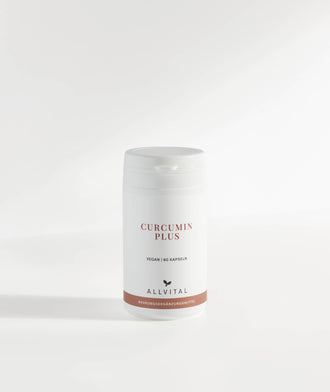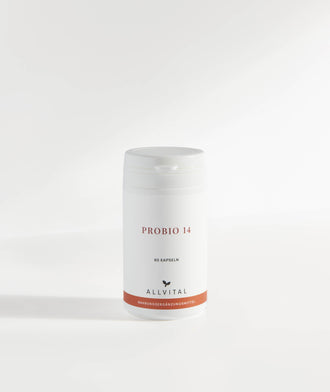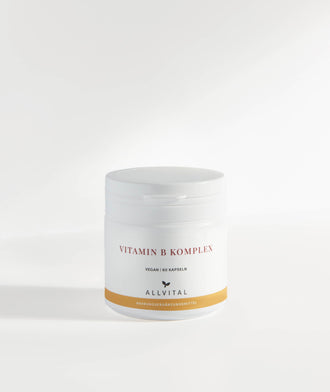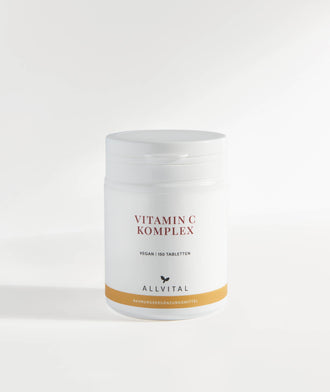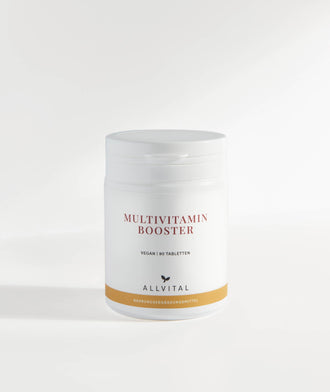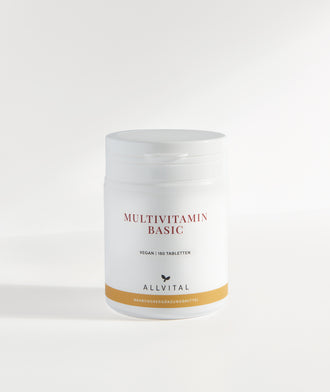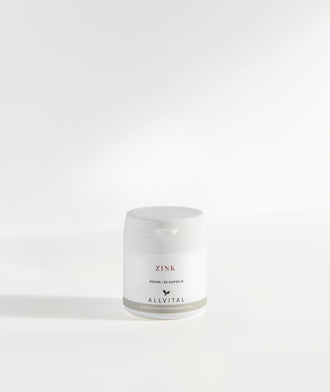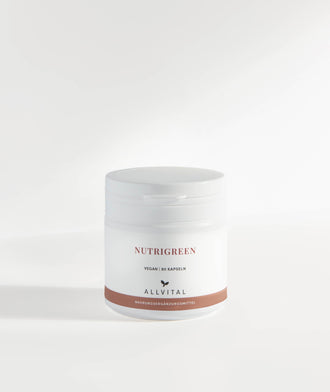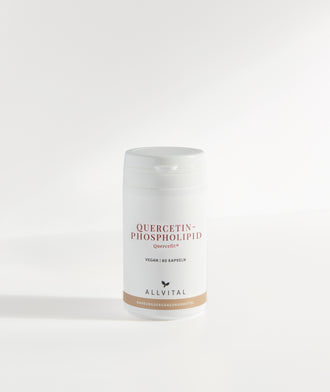
Naturally against hay fever
Find out exactly what hay fever is and what natural methods there are to support our body and alleviate the symptoms.When the weather finally gets better in the Spring, most people are drawn outside to enjoy nature. However, for some of us, this also means dealing with pollen from trees and grasses, which can trigger hay fever.
Here's a look at what hay fever actually is and some natural ways to support our bodies to ease the symptoms.
What is hay fever?
Hay fever, also known as allergic rhinitis, is an allergy to pollen. This includes pollen from different plants, with common triggers being grasses, grains and early blooming trees like birch, hazel, willow, and alder.
In the course of allergy development, the body forms antibodies (specifically immunoglobulin E or IgE) against certain proteins in the pollen. Upon subsequent exposure, this triggers a reaction where the IgE antibodies attach to mast cells, leading to the release of inflammatory substances like histamine. This process results in classic hay fever symptoms such as sneezing, itching, nasal congestion, and red, watery eyes.
Causes of hay fever
So, why do some people get hay fever or other allergies while others don't? There's no one-size-fits-all answer to this question, as several factors can contribute to allergy development. Essentially, it involves an immune system imbalance and a misguided defensive response to harmless substances like pollen and in some cases even food.
Factors that might play a role in allergy development include:
- Imbalanced gut flora
- Mucous membrane damage
- Genetic predisposition
- Being born via C-section
- Consuming cow's milk or milk alternatives from a bottle instead of breast milk
- Using antibiotics
- Unhealthy diet (high in sugar, gluten, processed foods, preservatives, sweeteners, unhealthy fats, low in fiber, etc.)
- Exposure to heavy metals
- Environmental pollutants in air, food, etc.
- Excessive cleanliness (limited exposure to nature and dirt)
- Stress
- Lack of sleep
- Sedentary lifestyle
The gut's role
Our gut plays a crucial role in our overall health and, consequently, in how allergies and autoimmune conditions develop. Ultimately, the effects of all the factors mentioned in the previous section on the immune system can be explained by an impairment of the intestinal flora and the mucosal flora of the nose (1).
For instance, an unhealthy diet, chronic stress, lack of sleep, sedentary lifestyle, toxins, and antibiotic use can upset the gut flora. Birth method, childhood diet, and lifestyle also heavily influence gut flora development. Research indicates, for example, that children born via C-section, with limited contact with maternal vaginal flora, have a higher allergy risk (2).
Bacterial metabolites
Intestinal bacteria produce various compounds (like short-chain fatty acids, amino acids, and vitamins) that nourish and impact the gut lining and overall health. Disrupted flora leads to a shortage of these vital compounds, harming the intestines and the body.
This lack, along with harmful germ growth, damages the gut lining, affecting the immune system housed there. A compromised gut barrier exposes the immune system to food components, fostering intolerances and allergies. This damage and metabolic product deficiency also trigger inflammation, allergies and autoimmune diseases.
The connection between the gut and nasal mucosa
In scientific studies, the so-called gut-"organ" axes are used to explain the effects of gut health on other organs. For example, there is also a gut-nose axis and a gut-skin axis, which show that the gut flora significantly influences the bacterial flora of the nasal mucosa and skin (3).
This shows once again that you should take a look at the gut in any type of allergic or autoimmune disease.
In addition to the gut, air quality is also important for the health of the nasal mucosa. Air pollution or dry indoor air are other factors that damage the protective barrier of the nose and promote the development of allergic reactions or infections.
Addressing hay fever
A holistic approach begins with the basics: prioritize quality sleep, reduce stress, stay active and eat a wholesome, low-toxin diet. Supplying essential micronutrients is crucial for optimal health.
Pre- and probiotics
Probiotics are beneficial microorganisms that help to build up healthy intestinal flora. Studies show that taking lactobacilli in combination with bifidobacteria in particular can alleviate the symptoms of hay fever.
Our product ProBio14 contains numerous types of lactobacilli and bifidobacteria. In addition to living microorganisms, ProBio14 also contains so-called prebiotics. These are various dietary fibres (e.g. inulin, fructooligosaccharides) that serve as food for beneficial types of bacteria and thus further promote their multiplication.
Vitamin C
Vitamin C is a powerful antioxidant and supports the function of the immune system. It also helps to reduce the fatigue that many people with hay fever suffer from. Our Vitamin C Complex contains vitamin C in four different natural forms supplemented with lysine and green tea extract.
B vitamins
B vitamins also play an important role in the functioning of the immune system. In addition, the B vitamins biotin (vitamin B7), niacin (vitamin B3) and riboflavin (vitamin B2) in particular contribute to the health of the mucous membranes.
The vitamin B complex contains a balanced combination of all 8 B vitamins.
Vitamin A
Vitamin A is a fat-soluble vitamin that increases the resistance of the skin and mucous membranes by stimulating the formation of new cells. It is also important for the functioning of the immune system and has an antioxidant effect.
You will find vitamin A together with numerous other micronutrients in Multivitamin Basic and Multivitamin Booster.
Zinc
As an essential trace element, zinc supports a healthy immune system and protects cells from oxidative stress. Zinc also plays an important role in the integrity of the mucous membranes and thus contributes to healthy mucosal function.
Our Zinc supplement contains a combination of 3 organic zinc salts with high bioavailability.
MSM
MSM, or methylsulfonylmethane, is an organic sulfur compound with high bioavailability. Sulphur is an integral component of numerous enzymes and is therefore involved in many metabolic processes. Among other things, the mineral plays an essential role in the formation of the body's own antioxidant glutathione and can help to alleviate inflammation.
Our MSM preparation is ideal for your daily supply of the underestimated mineral sulphur. In combination with other substances, you will also find MSM in the Glucosamine & Chondroitin Complex.
Quercetin
Quercetin is a secondary plant substance and yellow natural pigment found in many types of fruits and vegetables such as apples, onions and citrus fruits. It has antioxidant properties and reduces the release of histamine.
We recommend our Quercetin-Phospholipid product for this purpose. In NutriGreen, quercetin is combined with other vitamins (including biotin and vitamin B12) and amino acids. Curcumin Plus contains quercetin in combination with other plant antioxidants.
Sources
- Liu P, Hu T, Kang C, et al. Research Advances in the Treatment of Allergic Rhinitis by Probiotics. J Asthma Allergy. 2022;15:1413-1428. Published 2022 Oct 7.
- Kaczynska A, Klosinska M, Chmiel P, Janeczek K, Emeryk A. The Crosstalk between the Gut Microbiota Composition and the Clinical Course of Allergic Rhinitis: The Use of Probiotics, Prebiotics and Bacterial Lysates in the Treatment of Allergic Rhinitis. Nutrients. 2022;14(20):4328. Published 2022 Oct 16.
- Ouwehand AC, Nermes M, Collado MC, Rautonen N, Salminen S, Isolauri E. Specific probiotics alleviate allergic rhinitis during the birch pollen season. World J Gastroenterol. 2009;15(26):3261-3268.


